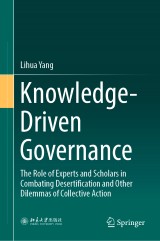Details

Knowledge-Driven Governance
The Role of Experts and Scholars in Combating Desertification and Other Dilemmas of Collective Action|
96,29 € |
|
| Verlag: | Springer |
| Format: | |
| Veröffentl.: | 19.11.2018 |
| ISBN/EAN: | 9789811329104 |
| Sprache: | englisch |
Dieses eBook enthält ein Wasserzeichen.
Beschreibungen
<p>This book explores a new model for addressing the central issue of environmental and other collective actions. An alternative to the classical models: central authority, privatization, and self-governance, it has provisionally been named “expert and scholar-based-” or “knowledge-driven governance”. The book also identifies seven working rules (or design principles) for successful knowledge-driven governance, and argues that the more strictly these rules are abided by, the more successful this model of governance becomes. Lastly, it demonstrates that in addition to Lindblom’s observed intellectually guided society and preference-guided/volition-guided society, there may be the possibility of a knowledge-driven society in which knowledge or intellect plays a greater role. The results obtained are supplemented by numerical calculations, presented as tables and figures. </p>
<p>This book is intended for graduate students, lecturers and researchers working in environmental management, environmental science and engineering, sustainable development, collective action, and public administration. </p>
<p>This book is intended for graduate students, lecturers and researchers working in environmental management, environmental science and engineering, sustainable development, collective action, and public administration. </p>
Scholar-Participated Governance as an Alternative Solution to the Collective Action Dilemma.- Four Major Roles of Scholars Participation: A Game Theoretical Analysis.- A Product-Institutional Analysis (PIA) Framework.- Significance and Mechanisms of Scholars’ Participation.- Seven Design Principles of Successful Scholar-Participated Governance.- Institutional Performance, Institutional Change, and Building an Intellect-Driven Society.- Building an Intellect-Driven Society: A Third Model.
Lihua Yang is a professor in the School of Government at Peking University, and a professor in the School of Public Administration and Director of the Workshop for Environmental Governance and Sustainability Science at Beihang University. He graduated from Peking University (1995-2002) and Indiana University (2004-2006) with two bachelor degrees and two master degrees. He got his doctorate in the School of Public Affairs, Arizona State University in May, 2009. His dissertation was awarded the Best Ph.D. Dissertation in Public Policy and Management in Asia by the Association of Public Policy Analysis and Management. His research interests include environmental governance and policy, public administration theory, public governance, research methods, and institutional economics. He has authored seven books and over 100 journal articles on environmental management, environmental science and policy, environmental governance and policy, public administration, collective action, collaborative governance, institutional analysis, conflict resolution, and research methods.
<p>This book explores a new model for addressing the central issue of environmental and other collective actions. An alternative to the classical models: central authority, privatization, and self-governance, it has provisionally been named “expert and scholar-based-” or “knowledge-driven governance”. The book also identifies seven working rules (or design principles) for successful knowledge-driven governance, and argues that the more strictly these rules are abided by, the more successful this model of governance becomes. Lastly, it demonstrates that in addition to Lindblom’s observed intellectually guided society and preference-guided/volition-guided society, there may be the possibility of a knowledge-driven society in which knowledge or intellect plays a greater role. The results obtained are supplemented by numerical calculations, presented as tables and figures. </p>
<p>This book is intended for graduate students, lecturers and researchers working in environmental management, environmental science and engineering, sustainable development, collective action, and public administration. </p>
<p>This book is intended for graduate students, lecturers and researchers working in environmental management, environmental science and engineering, sustainable development, collective action, and public administration. </p>
Develops knowledge-driven governance as model for resolving environmental and other collective action dilemmas Lists seven rules for successful knowledge-driven governance Demonstrates the possibility of a knowledge-driven society
Diese Produkte könnten Sie auch interessieren:

Decision Support Systems for Risk-Based Management of Contaminated Sites

von: Antonio Marcomini, Glenn Walter Suter II, Andrea Critto

96,29 €

Dynamics of Mercury Pollution on Regional and Global Scales

von: Nicola Pirrone, Kathryn R. Mahaffey

149,79 €














